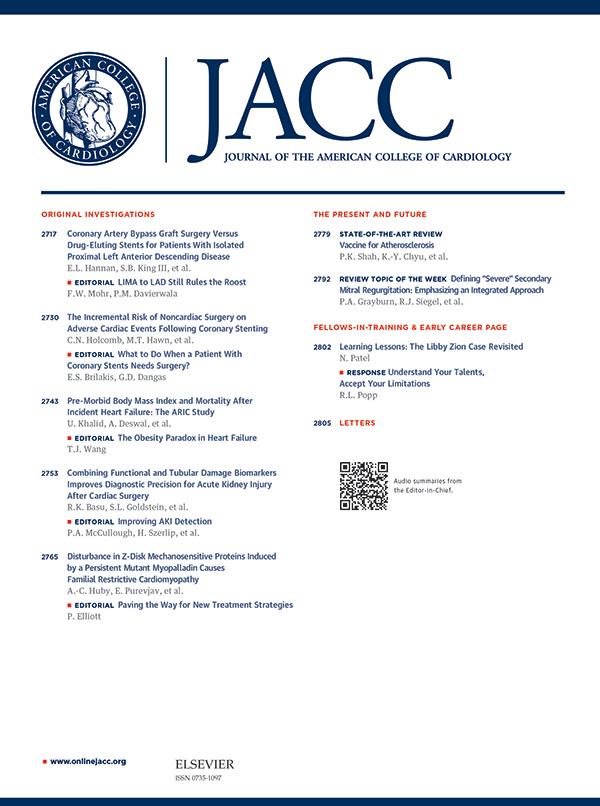2025 ACC关于成人心力衰竭肥胖管理的科学声明:美国心脏病学会的一份报告
IF 22.3
1区 医学
Q1 CARDIAC & CARDIOVASCULAR SYSTEMS
引用次数: 0
摘要
肥胖会增加心衰、冠状动脉疾病和中风的风险,而减肥可以降低心血管疾病的风险。鉴于新出现的证据表明,西马鲁肽和替西帕肽对HFpEF和肥胖患者的益处与健康行为干预相一致,临床医生应该意识到HF患者肥胖的最佳诊断、风险评估和管理。尽管抗肥胖药物在HFpEF中有早期的前景,但挑战仍然存在,包括BMI是否是识别肥胖和随后从抗肥胖药物中获益的最佳指标;抗肥胖药物对HF患者,特别是HFrEF患者的安全性;以及抗肥胖药物的好处主要是由于体重减轻的幅度还是由于其他作用机制。在这些新出现的证据和持续的挑战的激励下,本科学声明:1)回顾心力衰竭患者肥胖的诊断、评估和风险评估;2)描述了从生活方式干预到药物治疗到手术治疗的hf特异性管理策略;3)解决肥胖相关心衰的证据差距和未来方向。通过对肥胖的准确评估以及安全有效的干预措施的管理和监测,临床医生可以改善心衰合并肥胖患者的生活质量和功能能力,并有可能减少心衰事件的发生。本文章由计算机程序翻译,如有差异,请以英文原文为准。
2025 ACC Scientific Statement on the Management of Obesity in Adults With Heart Failure: A Report of the American College of Cardiology
Obesity confers increased risks of HF, coronary artery disease, and stroke, and weight loss can reduce cardiovascular disease risk. Given emerging evidence of the benefits of semaglutide and tirzepatide in individuals with HFpEF and obesity in concert with healthy behavioral interventions, clinicians should be aware of optimal diagnosis, risk assessment, and management of obesity in individuals with HF. Despite the early promise of anti-obesity medications in HFpEF, challenges remain, including whether BMI is the optimal metric to identify obesity and subsequent benefit from anti-obesity medications; the safety profile of anti-obesity medications for individuals with HF, particularly HFrEF; and whether the benefits of anti-obesity medications are attributed mainly to the magnitude of weight loss or due to other mechanisms of action. Motivated by this emerging evidence and ongoing challenges, this scientific statement: 1) reviews the diagnosis, evaluation, and risk assessment of obesity in HF; 2) describes HF-specific management strategies from lifestyle intervention to medications to surgery; and 3) addresses evidence gaps and future directions in obesity-related HF. With accurate evaluation of obesity as well as administration and monitoring of safe and effective interventions, clinicians may improve quality of life and functional capacity and potentially reduce HF events in individuals living with HF and obesity.
求助全文
通过发布文献求助,成功后即可免费获取论文全文。
去求助
来源期刊
CiteScore
42.70
自引率
3.30%
发文量
5097
审稿时长
2-4 weeks
期刊介绍:
The Journal of the American College of Cardiology (JACC) publishes peer-reviewed articles highlighting all aspects of cardiovascular disease, including original clinical studies, experimental investigations with clear clinical relevance, state-of-the-art papers and viewpoints.
Content Profile:
-Original Investigations
-JACC State-of-the-Art Reviews
-JACC Review Topics of the Week
-Guidelines & Clinical Documents
-JACC Guideline Comparisons
-JACC Scientific Expert Panels
-Cardiovascular Medicine & Society
-Editorial Comments (accompanying every Original Investigation)
-Research Letters
-Fellows-in-Training/Early Career Professional Pages
-Editor’s Pages from the Editor-in-Chief or other invited thought leaders

 求助内容:
求助内容: 应助结果提醒方式:
应助结果提醒方式:


